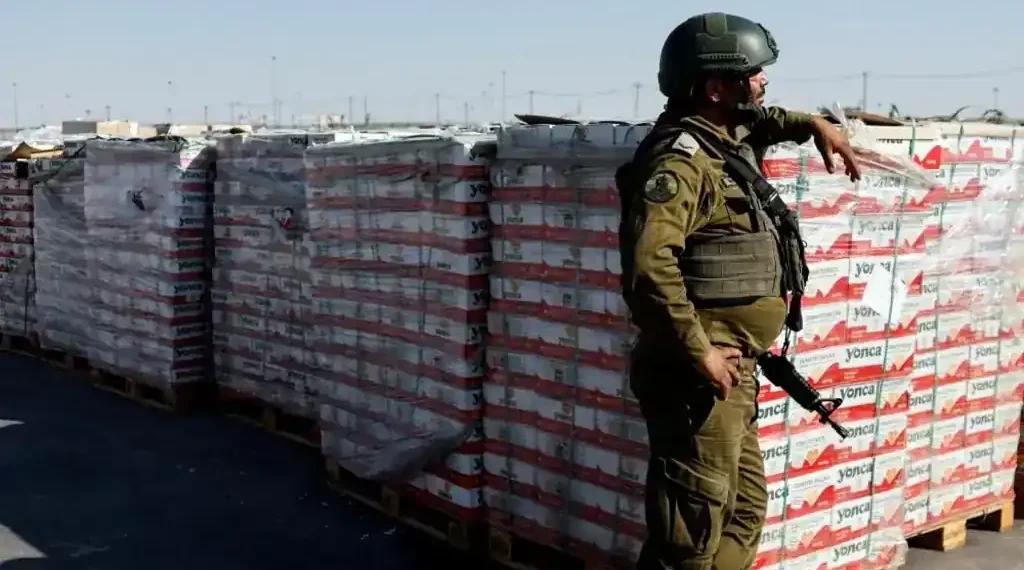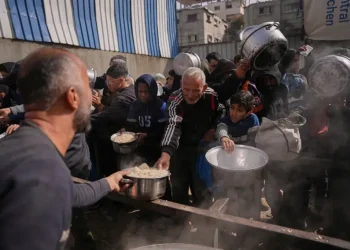Gaza air drops face mounting criticism from aid agencies
July 27, 2025 – 9:16 AM
As starvation worsens across the Gaza Strip, international aid organizations are sounding the alarm over the growing reliance on humanitarian air drops. While countries including Israel, the United Arab Emirates, and the United Kingdom have ramped up air delivery efforts, aid leaders argue that such actions are not only ineffective but potentially dangerous—labeling them a “grotesque distraction” from the urgent need to restore land access for meaningful relief.
Aid agencies say air drops fall short of Gaza’s real needs
The Israeli military announced over the weekend that it had initiated air drops of food and supplies into Gaza. The move came alongside a proposal to establish “humanitarian corridors” for UN aid convoys—though details remain vague. Other countries, including Jordan and the UAE, are expected to follow with their own air drops, and UK Prime Minister Keir Starmer stated his government is doing “everything we can” to support Gaza through aerial aid.
However, humanitarian leaders remain unconvinced.
Ciarán Donnelly of the International Rescue Committee noted that air drops “can never deliver the volume or quality” of assistance required to address the escalating crisis. His concerns are shared by more than 100 international NGOs and human rights groups, many of whom have warned of an impending famine in Gaza.
UN and aid groups warn of man-made starvation
According to the UN World Food Programme, one-third of Gaza’s population is going without food for days at a time. The organization highlighted that approximately 90,000 women and children are in urgent need of nutritional treatment. The agency called the situation a “man-made mass starvation.”
On Saturday, Gaza’s Hamas-run health ministry reported five new deaths due to malnutrition, pushing the total number of such deaths since the war began to 127—85 of them children.
Humanitarian access via traditional land routes remains the most effective and scalable solution, according to the UN and independent relief organizations. Yet aid convoys are often delayed or denied entry.
UN official: Political will, not planes, is what’s needed
Philippe Lazzarini, Commissioner-General of the UN Relief and Works Agency (UNRWA), criticized air drops as costly, inefficient, and even dangerous. “They can kill starving civilians if they go wrong,” he said. Lazzarini added that his agency has 6,000 trucks worth of aid sitting in Jordan and Egypt, awaiting approval to enter Gaza.
“What we need is political will—to lift the siege, open the gates, and guarantee safe, dignified movement for aid,” Lazzarini wrote on social media. “Driving aid through is much easier, more effective, faster, cheaper, and safer. It’s more dignified for the people of Gaza.”
While Israel claims there are no barriers to aid deliveries, some government officials have accused the UN of cooperating with Hamas to restrict distribution—a claim the UN firmly denies. A recent USAID assessment also found no evidence of systematic looting of aid by Hamas.
Air drops risk civilian lives and create chaos, say experts
Past attempts at air drops underscore the challenges. Britain’s Royal Air Force delivered 110 tonnes of aid last year in a series of joint missions led by Jordan. Yet those missions only scratched the surface of Gaza’s massive humanitarian needs.
BBC analysis showed that it would take over 160 cargo plane flights just to deliver one meal to each of Gaza’s 2.1 million residents. Given that Jordan reportedly has around 10 C-130 aircraft and the UAE 8, the logistics of scaling up air drops to meet daily needs are impractical at best.
Shaina Low of the Norwegian Refugee Council shared harrowing accounts from Gaza, where people were “drowning” in the Mediterranean trying to retrieve dropped packages. Others were injured or killed as aid boxes plummeted to the ground.
“Even when drops succeed, they result in chaos,” Low said. “People fight over the supplies. Injuries are common. It’s not a sustainable or humane method.”
Residents interviewed by the BBC expressed fear over the dangerous and unpredictable nature of the drops. One Gazan man described them as “unsafe” and said they have “caused numerous tragedies,” including damage to tents and injuries to civilians.
Human suffering worsens as water and food supplies dwindle
For many Gazans, the issue is no longer just food—but basic survival. Along with hunger, dehydration is becoming a daily threat. One mother told the BBC, “We have no food, no bread, not even water. We’re craving even water.”
Israel launched its war in Gaza following the October 7, 2023 Hamas-led attacks that killed around 1,200 people in southern Israel and led to over 250 hostages being taken. Since then, more than 59,000 people have reportedly been killed in Gaza, according to the territory’s health ministry.
In March, Israel implemented a complete blockade, halting all aid deliveries. A limited easing followed global pressure and warnings of famine, but the flow of food, medicine, and fuel remains far below necessary levels.
Massive displacement and destruction intensify the crisis
According to UN estimates, over 90% of Gaza’s homes have been damaged or destroyed. Most residents have been displaced multiple times since the conflict began. The lack of safe shelter, clean water, and access to health care has exacerbated the humanitarian emergency.
While air drops may offer symbolic relief and some short-term benefit, experts and aid workers are calling for a more comprehensive, ground-based strategy to reach those in desperate need.
Conclusion: Air drops are not a solution, say aid groups
In the words of humanitarian leaders, air drops alone cannot solve the hunger crisis unfolding in Gaza. They are expensive, risky, and a poor substitute for the delivery of life-saving aid through secure land routes.
As the humanitarian catastrophe deepens, global leaders face increasing pressure to prioritize access, logistics, and diplomacy—over optics and theatrics.
Stay informed with in-depth, balanced reporting on the Gaza crisis and global humanitarian efforts. Follow us for updates and insights that go beyond the headlines.
This article was rewritten by JournosNews.com based on verified reporting from trusted sources. The content has been independently reviewed, fact-checked, and edited for accuracy, neutrality, tone, and global readability in accordance with Google News and AdSense standards.
All opinions, quotes, or statements from contributors, experts, or sourced organizations do not necessarily reflect the views of JournosNews.com. JournosNews.com maintains full editorial independence from any external funders, sponsors, or organizations.
Stay informed with JournosNews.com — your trusted source for verified global reporting and in-depth analysis. Follow us on Google News, BlueSky, and X for real-time updates.













